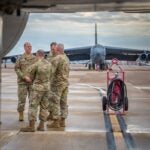
The Pentagon Office of Inspector General (OIG) plans a number of reviews related to the former Operation Freedom's Sentinel and the current Operation Enduring Sentinel in Afghanistan and to the U.S. Central Command (CENTCOM) area of responsibility, in general. U.S. military forces withdrew from Afghanistan last August, and military leaders said that they want to be able to conduct "over the horizon' strikes from bases in the Middle East against ISIS-K targets in Afghanistan, if needed. The latest quarterly OIG…













